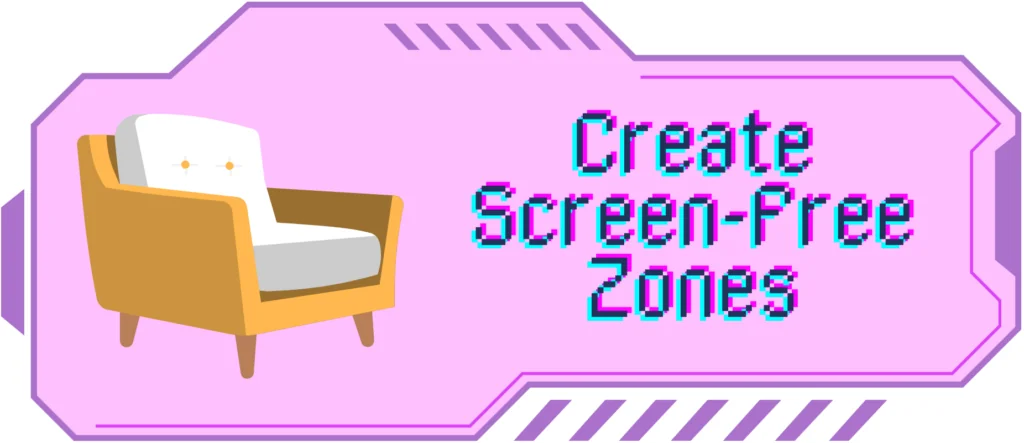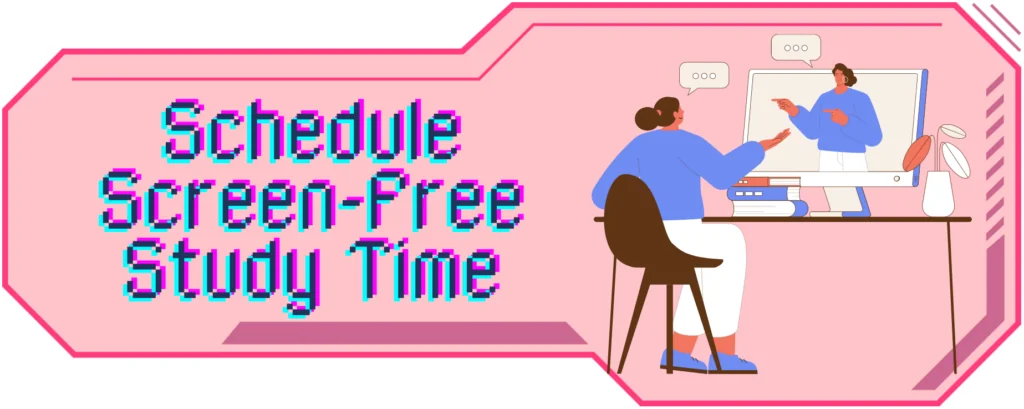How much time have you spent scrolling through TikTok or Instagram reels (if you are not like other girls) this summer break? Have you reached the brainrot recommendations already? Don’t get it the wrong way, we ALL are using these platforms to just switch off our brains and relax. Though, with the new school year creeping in, you might rethink your usual media habits. So, if you were considering reducing your screen time — maybe this article is your sign to start.

✅ AI Essay Writer ✅ AI Detector ✅ Plagchecker ✅ Paraphraser
✅ Summarizer ✅ Citation Generator
Key Takeaways
- Higher screen time is inevitable in our world, yet it is still important to try and find a balance between work and online leisure and try to substitute doom-scrolling with real-life activities.
- Reducing screen time can improve not just your productivity, but also your sleep quality, reduce eye strain, and enhance your physical and mental health.
- Set screen time limits, create screen-free zones, and embrace offline activities to regain control over your time, productivity, and overall life satisfaction.
Considering how digitalized our reality is, it is no wonder that the average screen time for college students and even for high schoolers has risen dramatically over the past few years. Online education during the COVID-19 pandemic (and for some even now) has made enough of a dramatic change, yet now, thanks to TikTok (and whatnot) the screen time has probably increased x10 times.
Let’s be clear, we don’t say that you can’t sometimes enjoy your favorite creators and silly little dances. Yes, staring at a screen is probably not the best way to spend your free time, but well, that’s our reality now and we can’t deny it. The key here is to find a balance between online and real-life presence, studying (including distance studying practices), and scrolling through reels.
Benefits of Limiting Screen Time – Why Should You Do It
Now, we all probably have some kind of idea that less screen time is better for us. Why? Well, if you ask a random person (even better – a student) on the street, 9 times out of 10 they will say that it at least helps improve their sleep schedule. Others may also mention that it will help them stay focused on their tasks or improve their social life (this benefit is honestly quite debatable). However, it is also almost guaranteed that despite the obvious advantages mentioned, neither of these people actually practices screen time regulation.

As we see it, despite the fact that we understand the possible benefits of spending fewer hours with our gadgets, we don’t fully grasp the influence such practices have on our lives. So, we decided to lay all the cards down in front of you and show which aspects of your day-to-day life can be significantly improved (and how) thanks to lower screen time. Needless to say, that they all contribute to your every day productivity and therefore can help you become a more organized and diligent student overall.
Scroll Less – Sleep Better
Let’s start with the most obvious benefit of ditching your phone for a couple of hours – better sleep habits. Picture this: it’s late at night, and you’re scrolling through your phone, lost in the screen’s bright glow as TikToks loop endlessly. You finally decide to put aside your device and wind down, but as you lie in bed, sleep escapes you. Sound familiar? That’s because blue light—emitted by screens—disrupts your body’s production of melatonin, the hormone responsible for regulating sleep. Reducing screen time, especially before bed, can restore your natural sleep-wake cycle. This means getting more sleep, and what’s more important – improving the quality of your sleep. You are more likely to have a deeper, more restorative, and refreshing rest if you won’t stare at the screen even for 15-20 minutes before bed.
Forget About Eye Strain
Do you remember ever feeling that dry sensation in your eyes after a marathon session in front of your computer? Digital eye strain is a common result of excessive screen time. Beyond the discomfort, prolonged screen exposure can even contribute to long-term vision issues like nearsightedness. Taking regular breaks and reducing overall screen time can give your eyes the break they need, helping to preserve your vision for the future. It’s also a good idea to consider using blue light glasses when you are digitally engaged.
Improve Your Physical Health
Let’s face it: we spend a lot of time sitting—at desks, on the couch, or in transit—all while staring at screens. This stationary lifestyle can mess up your posture, leading to chronic aches and pains in your back, neck, and shoulders. Plus, the lack of movement contributes to other health problems, like heart issues and muscle stiffness. That’s why, when you think about reducing screen time, you might want to consider switching to more physical activities. Choose to do something that encourages you to get up, move around, and break free from the cycle of stationary life, which can significantly improve your physical health.
Cognitive and Mental Stability
As we move on to such an important topic of our mental health, let’s also touch on the toxicity of social media. Platforms like Instagram and X ( former Twitter) often serve as breeding grounds for comparison culture. People post the highlights of their lives, creating an unrealistic standard of success and happiness that can negatively impact your self-esteem. Moreover, social media can expose you to cyberbullying and trolling, contributing to severe emotional distress. And let’s not forget the overwhelming amount of information (nowadays – mostly negative too) that floods your feed daily, making it tough to separate fact from fiction, further fueling anxiety.
As such, it seems pretty self-explanatory why excessive screen time, especially on social media, can lead to anxiety, depression, and a shorter attention span. Our brains are constantly bombarded with information, making it harder to focus, process thoughts, and even retain memories. By cutting back on screen time, especially in the digital spaces that contribute to stress, you can protect your mental health, leading to greater clarity, focus, and emotional resilience
Practical Tips on How to Reduce Screen Time as a Student
Okay, so if you weren’t sure as to why should you cut back on doom-scrolling, we hope that now you have the proper understanding of how it can improve your life. Not going to lie, being this mindful (and demure) – is a great start. So, now we can peacefully move on to the realization of the screentime cutting project. We will include a couple of recommendations that usually work for students, however, keep in mind that everyone’s unique. As such, you might want to try a couple of different ways to adjust your screen time to find what works best for you.
It sounds basic, but it’s incredibly effective. Start by using the built-in screen time tracking features on your phone or laptop. Set daily limits for your most distracting apps, like TikTok or Instagram. Research shows that reducing screen time, even by just an hour a day, can significantly improve your mental and physical well-being. When you hit your limit, it’s a cue to switch gears and do something else—perhaps a task that you’ve been putting off or something enjoyable that doesn’t involve staring at a screen.
Identify the places where you tend to get sucked into your screen the most—your bed, your study space, or even at the dining table. Make these areas no-phone zones. Keeping your devices out of sight, like stashing them in a box in another room, can help you stay more focused on the task at hand. Studies show that simply having your phone within reach, even if you’re not using it, can reduce your focus and productivity.
There are plenty of apps designed to help reduce screen time—ironic, right? But they work. Apps like Forest or StayFocusd can turn screen reduction into a bit of a game. For example, Forest lets you grow a virtual tree that thrives while you stay off your phone. If you give in to temptation, your tree withers away. It’s a fun and visual way to keep yourself accountable and make reducing screen time less of a chore.
You most probably know about the 20-20-20 rule, right? This is the method when every 20 minutes you take a 20-second break and look at something 20 feet away. This helps reduce eye strain and mental fatigue, both of which are common after long periods of screen time. For students, this could mean taking a short walk, doing some stretches, or grabbing a healthy snack—anything that will take you away from your computer or phone.
There’s also another famous way to organize work time with breaks – the Pomodoro method. This time management strategy involves breaking your study time into 25-minute focused sessions followed by 5-minute breaks. After four sessions, take a longer break of 20-30 minutes. This method helps reduce screen time and improve productivity. There are even apps designed specifically for this, like Focus To-Do and Pomodoro (itself), which can help you stay on track and make sure those breaks are truly screen-free.
In today’s digital age, it’s easy to forget that not all study materials need to be online. Opt for physical copies of textbooks and notes whenever possible. Research proves that taking notes by hand can improve memory retention and comprehension compared to typing on a laptop.
This is something for those who seek a more disciplined approach. At its core, it means dedicating specific periods in your day when you commit to studying without any screens. Whether it’s an hour or two, sticking to this routine can help you break the habit of constantly checking your phone.
Moreover, you can also arrange whole study groups (if you are good at studying with other people) where everyone will ditch their phone and simply focus. Being in such a social circle will help you stay consistent and committed since you will see everyone sticking to the routine.
To Draw the Line
In a world where screens dominate almost every aspect of our lives, finding a balance between digital engagement and real-life experiences is more important than ever. This is especially true when it comes to studying.
While technology offers incredible tools and opportunities, it’s easy to become overly dependent on our devices, to the point where they start to dictate our routines, interfere with our life objectives, and take away from our mental well-being. The key to managing this is not about completely cutting out screen time—after all, it’s an important part of modern life—but about being mindful of how and when we use our devices.
Regularly implementing small, practical changes, like setting limits, creating screen-free zones, and embracing offline activities, you can regain control over your time, your health, and your productivity. The goal is not to reject technology but to use it in a way that enriches, rather than detracts from your life.
FAQ
Follow us on Reddit for more insights and updates.











Comments (0)
Welcome to A*Help comments!
We’re all about debate and discussion at A*Help.
We value the diverse opinions of users, so you may find points of view that you don’t agree with. And that’s cool. However, there are certain things we’re not OK with: attempts to manipulate our data in any way, for example, or the posting of discriminative, offensive, hateful, or disparaging material.